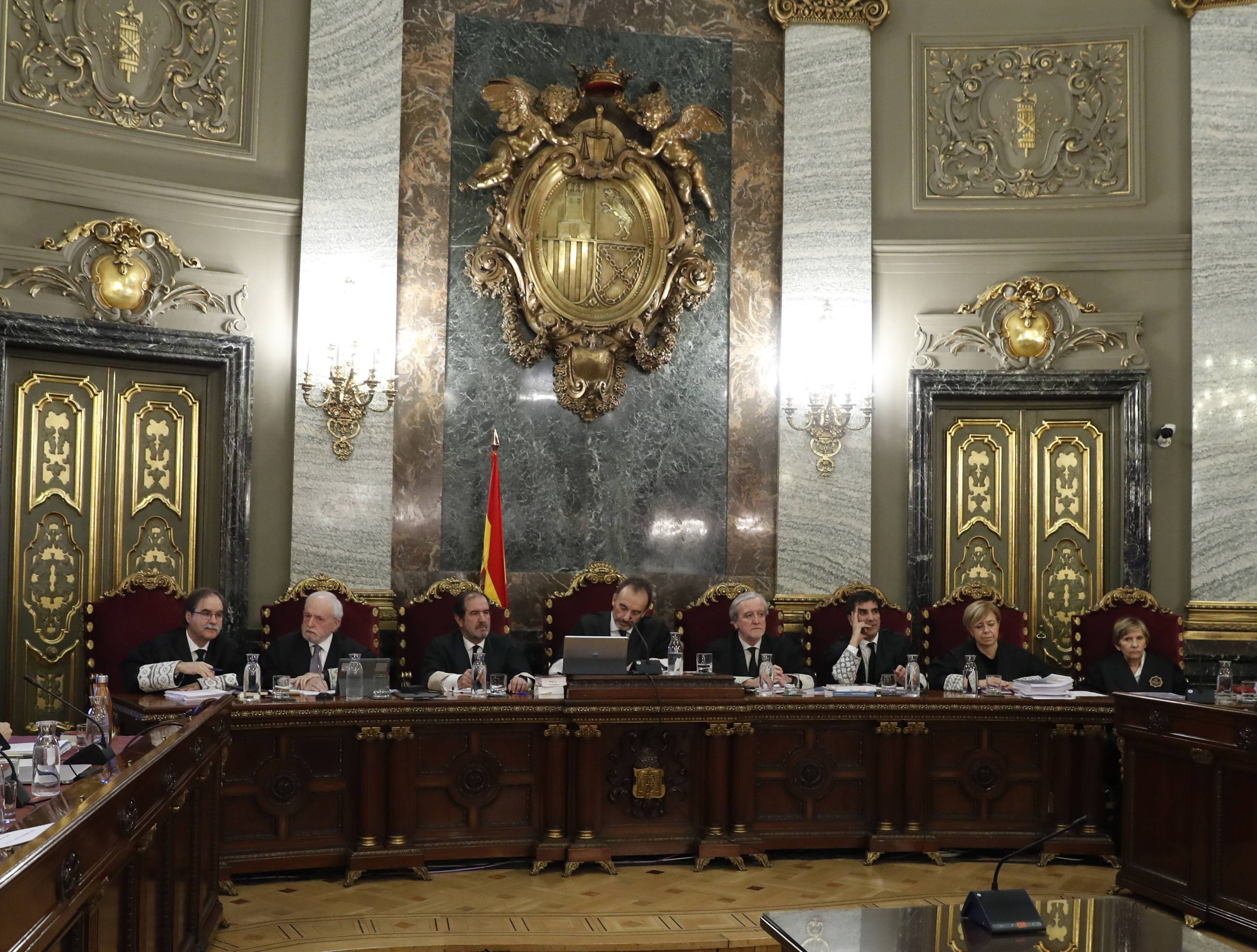The sky in Madrid this spring is threatening to darken over the Supreme Court as a front comes in anticipating a storm. The clouds started to take shape on Monday, when a meeting of the Central Electoral Board confirmed that two of the judges from the Catalan independence trial are also part of that body. Warning lights came on immediately. This morning, the Supreme Court has announced that the two judges in question won't intercede again in Electoral Board meetings which "have anything to do with the legal process".
The chamber trying the Catalan referendum had to pause the hearing on Monday lunchtime, despite the buildup of witnesses and limits on the calendar, so that judges Luciano Varela and Ana María Ferrer could go to the Congress to take part in the Electoral Board meeting. From the Supreme Court to the Congress is a pleasant fifteen-minute walk, down calle del Barquillo or, quieter still, along Recoletos. But, in the middle of a process with a political whiff, that kilometre and a half can take on the scale of a jump into the void.
What's more, that meeting considered nothing more or less than Ciudadanos's complaint against the presence of yellow loops, symbols of support for those on trial in the Supreme Court, on public buildings belonging to the Catalan government. Although the Supreme Court came out today to assure that its two judges had abstained, the Electoral Board ended up deciding against such symbols, and ordering the Catalan president, Quim Torra, to remove them. The president has hinted he won't do so, which could see him in contempt.
The episode of the loops, beyond its own controversy, has sparked uneasy rumbles from observers and legal scholars, who believe it compromises the judges' impartiality and reveals clear ideological prejudice against the defendants.
Ante la revelación de que Magistrados del Tribunal Supremo son también miembros de la Junta Electoral, las defensas tienen una gran oportunidad de denunciar esta flagrante falta de una mínima imparcialidad respecto de Catalunya.
— Observatorio del Sistema Penal y Derechos Humanos (@OSPDH1) 12 de març de 2019
Translation: Given the revelation that magistrates from the Supreme Court are also members of the Electoral Board, the defences have a great opportunity to denounce this flagrant lack of a minimal impartiality with respect to Catalonia.
#1O Dos magistrados de la Sala que juzga a los líderes catalanes son miembros de la Junta Electoral Central.
— Joan Queralt (@JoanQueralt) 12 de març de 2019
El lunes el TS suspendió la vista por una reunión de esa Junta.
En esa sesión ha prohibido la estelada y lazos amarillos en edificios de la GENCAT.
Two magistrates from the chamber trying the Catalan leaders are members of the Central Electoral Board. This Monday, the Supreme Court suspended the hearing for a meeting of that board. In that session, it banned the estelada [pro-independence flag] and yellow loops on Catalan government buildings.
So far, the warnings have come from outside the court, but in the corridors there, despite noting that president judge Marchena cut short the debate when far-right party and private prosecution Vox protested the presence of yellow loops in the chamber, it is admitted that the two judges' strolls between the Congress and the Supreme Court could end up compromising the court as many of the defendants are candidates for the elections in the next couple of months.
In the dock, there are four future candidates for the Congress (Oriol Junqueras, Jordi Sànchez, Jordi Turull and Josep Rull) and one for the Senate (Raül Romeva), not counting Quim Forn's candidacy for mayor of Barcelona and Junqueras again for the European Parliament. And that's to say nothing of the candidacy of the president in exile, Carles Puigdemont, the European Parliament himself.
It's to be expected that both the Supreme Court and the Electoral Board will have to repeatedly comment in the coming days in response to petitions from the defendants in provisional detention to take part in meetings, election events and debate. As well as using rivers of ink on Puigdemont's candidacy which, as he explained to radio station Rac1, could grant him immunity in the whole of Europe should he win a seat. Today, the Supreme Court has had to dodge questions on that with a "no comment".
Some voices were warning this morning that, if the two judges are involved in two issues in constant collision, it could significantly "contaminate" the process. The Electoral Board is formed by eight magistrates from the Supreme Court designated by the General Council of the Judiciary, but also five tenured law or political science professors nominated by the parties in the Congress. Debates there, therefore, already go beyond the purely legal.
The Supreme Court has tried to nip the controversy in the bud. This lunchtime, the two judges have assured they abstained in yesterday's vote on yellow loops and that they won't take part in any other debate relating to the legal process.
The storm is just starting to brew over the Supreme Court; for the moment, however, the sun still shines, and the chamber has got its windows shut.

